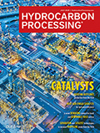Octane
Montana Renewables announces closing of $1.44-B U.S. DOE loan for renewable fuels and biomass energy facility
Calumet, Inc. announced the closing of a $1.44-B guaranteed loan facility with the U.S. Department of Energy Loan Programs Office that will fund the construction and expansion of the 300-MMgpy renewable fuels facility owned by Montana Renewables
Avina Clean Hydrogen to build $820-MM SAF plant in southwest Illinois (U.S.)
Avina Clean Hydrogen to build an $820-MM, 120-MMgpy SAF plant in southwest Illinois, leveraging KBR’s alcohol-to-jet technology
Neste, Air Canada sign agreement for the supply of 60,000 tons of Neste MY Sustainable Aviation Fuel
Neste and Air Canada have agreed on the supply of 60,000 tons of unblended, neat Neste MY Sustainable Aviation Fuel for use on flights from Vancouver International Airport.
Repsol launches Nexa, the commercial brand of its 100% renewable premium diesel in service stations
Repsol has launched the commercial name of its 100% renewable diesel in its service stations: Nexa 100% Renewable Diesel, a premium fuel designed for all diesel engines.
Audi, bp team up with strategic sustainable fuels partnership for Formula 1
Audi and bp are joining forces in an extensive new strategic partnership in Formula 1, focused on adhering to new FIA F1 Technical Regulations featuring enhanced electrification and use of Advanced Sustainable fuels.
Hydrogen-rich content gasoline: A new concept for paraffinic gasoline reformulation
Several refiners are evaluating a new gasoline-formulation technology called hydrogen (H2)-rich-content (HRC) gasoline. This patented technology uses low-sulfur, H2-rich refinery blendstocks like straight-run gasoline, isomerates, alkylate, butanes and renewable naphtha in gasoline blends, and adds aromatic amines (a high-octane gasoline additive) to make a drop-in specification gasoline.
A multi-objective optimization study for an integrated oil refinery-petrochemical plant—Part 2
In this research, the integration of an oil refinery and an ethylene-producing facility was examined using a mixed-integer nonlinear programming model that prioritized maximizing ethylene and propylene production and net profit.
Synhelion and Pilatus launch strategic partnership to scale solar fuels
Synhelion and Pilatus Aircraft Ltd enter into a strategic cooperation with the aim of accelerating the scaling of solar fuels for aviation.
World’s first in-flight study of commercial aircraft using 100% sustainable aviation fuel shows significant non-CO2 emission reductions
Results from the world's first in-flight study of the impact of using 100% sustainable aviation fuel (SAF) in both engines of a commercial aircraft show a reduction in soot particles and formation of contrail ice crystals compared to using conventional Jet A-1 fuel.
Next Wave Energy starts up world's first standalone alkylation complex
Next Wave Energy Partners selected Elessent Clean Technologies, Inc. (Elessent) in 2019 to provide STRATCO® alkylation technology at the world’s first stand-alone alkylation complex.

- Britain will not bail out bioethanol industry hit by Trump trade deal 8/15
- Russian energy facilities targeted recently in drone attacks 8/15
- Shell: Norco, Louisiana (U.S.) refinery gasoline unit work to start on Friday 8/15
- Sanctions-hit Indian refiner Nayara in talks with govt to sustain operations 8/15
- The API challenges Trump plan to cut biofuel import credits 8/15
- IAG selects record 29 startups for accelerator program 8/15




